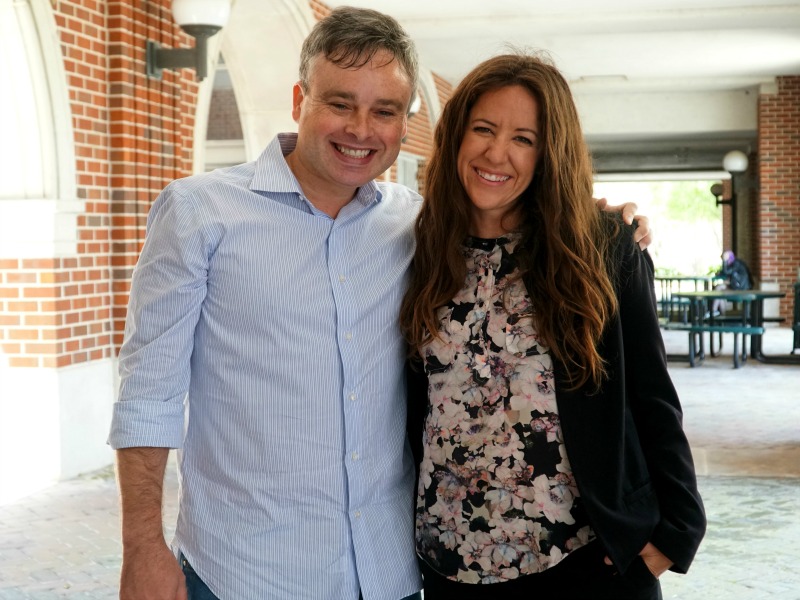Home / Giving back: Tulane student wins award for 432 hours of pro bono service
Giving back: Tulane student wins award for 432 hours of pro bono service
April 18, 2019 10:15 AM
|

Andrew Taylor (L'19) will receive the prestigious 2019 Louisiana State Bar Association Law Student Pro Bono Award for his commitment to providing legal services to the poor, including at Rising Foundations, a nonprofit that helps former convicts return to society. “Andrew set a very high bar for all future interns and volunteers," said Kelly Orians (right), Executive Director of Rising Foundations. (Photo : Alina Hernandez)
He once taught English in Asia, worked as an investment consultant and volunteered for a Kenya-based NGO. At Tulane Law, he rose to become editor of Tulane’s Environmental Law Journal and published an article in a major environmental journal as a second-year law student.
In between, Andrew Taylor, a third-year law student, completed 432 hours of pro bono hours – more than eight times what is required in law school – to work for agencies that do everything from helping former convicts return to society to assisting the homeless and veterans.
For his commitment to giving back, he is receiving the prestigious 2019 Louisiana State Bar Association Law Student Pro Bono Award. It is presented annually to a law student who has demonstrated a dedication to providing legal services to the poor. He will receive the award May 21st at the Louisiana Supreme Court.
In granting Taylor the award, the LSBA noted that through, “your commitment and work on behalf of indigent defendants, formerly incarcerated persons and veterans, you have modeled compassion and dedication to pro bono work and the commitment to access to justice so fundamental to the legal profession. We believe you embody the maxim ‘To make a difference, be the difference’ and are so proud of your accomplishments in the public service arena.”
Last year, Tulane Law alum Kirby Kenny (L’18) won the award after performing 744 hours of pro bono work during her three years in law school.
Taylor also receives the law school’s top pro bono honor, the Jackson-Ryan Pro Bono Advocate Award, having served the highest number of hours.
Taylor has for the better part of his life given back to others. Before enrolling in law school, he earned three master’s degrees and taught English language and writing in Asia. He worked in Connecticut as an investment consultant and he volunteered and is a long-time board member of a Kenya-based nongovernmental organization.
While in law school, he rose to become editor of the 2019 editions of the Tulane Environmental Law Journal and served as a research assistant to Nadav Orian Peer, visiting assistant professor and Murphy Institute fellow, and Stacy Seicshnaydre, dean of Experiential Learning and Public Interest Programs and William K. Christovich Professor of Law. He is currently working in Tulane's Civil Rights and Federal Practice Clinic as a student-attorney.
Last summer, he worked with the Natural Resources Defense Council, the Gulf Restoration Network and the Southeast Louisiana Legal Services on their homeless and veterans project.
“Andrew set a very high bar for all future interns and volunteers,” said Kelly Orians, Executive Director of Rising Foundations, where Taylor worked last year. “Andrew approached every case and every client with a respectful curiosity and a sincere desire to meet them where they were at, determine what they defined as success, and fought diligently to make it happen. Andrew did not judge, and he did not substitute his own values for those of our clients. That approach reflects a sophistication rarely seen in licensed attorneys, let alone second-year law students.”
As a rising third-year law student last summer, Taylor published an article in the Environmental Law Reporter, a major environmental law periodical.
Taylor’s article, “Union of Concerned Scientists v. Pruitt: Can EPA Purge Its Academic Science Advisors?” analyzed Union of Concerned Scientists v. Pruitt by providing relevant background information and then examining the four specific claims put forth in the suit.
As he readies for graduation, he sees work for the underserved as part of his calling. He attributes a number of Tulane Law experiences with nurturing that.
“My pro bono work, including participation in the Civil Rights Clinic and various environmental causes, as well as the complement of Prof. Westley's Critical Race Theory seminar, was the most gratifying aspect of my TLS experience,” Taylor said. “Being exposed to, in particular, the singular mass incarceration and environmental situation in Louisiana was entirely valuable and compelling, life-altering, even.”